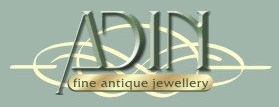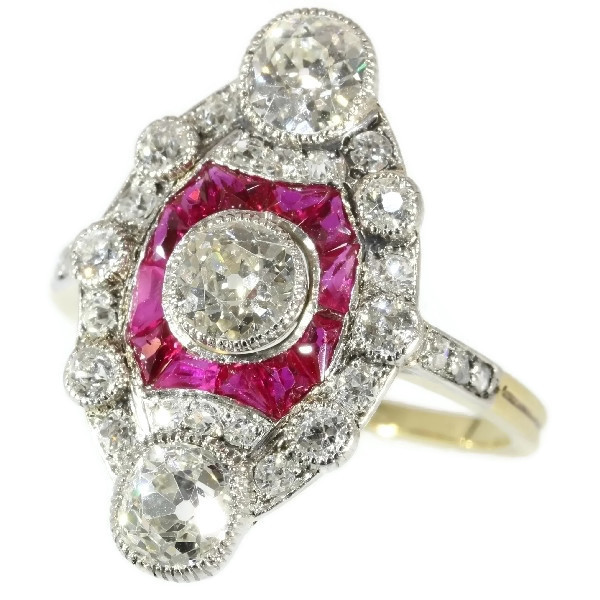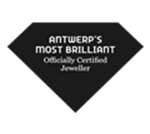We offer layaway, spread payments on the piece of your dreams. Ask us for details. Free insured shipping on all orders !!!
Stunning Belle Epoque Art Deco diamond and ruby engagement ring
The design of this enchanting engagement ring in platinum and 18K yellow gold will prove you to be a jewel true to the Belle Epoque as well as the Art Deco style.
A grand old brilliant cut diamond aligns from within a bulging square of 12 rubies with two old mine brilliant cut diamonds. With the support of a row of three diamonds, those two brilliants serve as the corners of a marquise shaped baté rim. Adding only
even more depth to this design, each side of the rim consists of three elevated old mine brilliant cut diamonds alternating with four deeper encrusted diamonds.
When even the settings of the three rose cut diamonds in each side of the shank are azure cut, it's clear that the craftsman of this piece from 1920 spared no expense in its making.
Nor should anyone do so in convincing their dearest of their sincere affection.
Antique jewelry object group: engagement ring (or anniversary ring)
Condition: excellent condition
- (more info on our condition scale)
Country of origin:
Although it does not carry any legible control marks we believe this to be of Belgian origin.
Style:
Something between Art Deco and Belle Époque - Art Deco is an eclectic artistic and design style which had its origins in Paris in the first decades of the 20th century. The style originated in the 1920s and continued to be employed until after
World War II. The term "art deco" first saw wide use after an exhibition in 1966, referring to the 1925 Exposition Internationale des Arts Décoratifs et Industriels Modernes that was the culmination of high-end style modern in Paris. Led by the
best designers in the decorative arts such as fashion, and interior design, Art Deco affected all areas of design throughout the 1920s and 1930s, including architecture and industrial design, as well as the visual arts such as painting, the graphic arts
and film. At the time, this style was seen as elegant, glamorous, functional and modern. - See also: Art Deco.
And the Belle Époque (French for "Beautiful Era") was a period in European social history that began during the late 19th century and lasted until World War I. Occurring during the time of the French Third Republic and the German Empire, the
"Belle Époque" was named in retrospect, when it began to be considered a "golden age" the major powers of Europe, new technologies improved lives and the commercial arts adapted Renaissance and eighteenth-century styles to modern forms. In the
newly rich United States, emerging from the Panic of 1873, the comparable epoch was dubbed the Gilded Age. In the United Kingdom, this epoch overlaps the end of what is called the Victorian Era there and the period named the Edwardian Era.
or more info on styles
Style specifics: This is something between Belle Époque and Art Deco.
The Belle Époque
(French for "Beautiful Era") was a period in European social history that began during the late 19th century from the Franco-Prussian War (1870-1871) and lasted until World War I (1914-18).
Occurring during the time of the French Third Republic and the German Empire, the "Belle Époque" was named in retrospect, when it began to be considered a "golden age" the major powers of Europe, new technologies improved lives and the commercial
arts adapted Renaissance and eighteenth-century styles to modern forms.
In the newly rich United States, emerging from the Panic of 1873, the comparable epoch was dubbed the Gilded Age. In the United Kingdom, this epoch overlaps the end of what is called the Victorian Era there and the period named the Edwardian Era.
In the Belle Époque cheap coal and cheap labour contributed to the cult of the orchid and made possible the perfection of fruits grown under glass, as the apparatus of state dinners extended to the upper classes; champagne was perfected during the
Belle Époque. Exotic feathers and furs were more prominently featured in fashion than ever before, as haute couture was invented in Paris, the centre of the Belle Époque, where fashion began to move in a yearly cycle; in Paris restaurants
such as Maxim's achieved a new splendour and cachet as places for the rich to parade, and the Opéra Garnier devoted enormous spaces to staircases as similar show places.
After mid-century, railways linked all the major cities of Europe to spa towns like Biarritz and Deauville; their carriages were rigorously divided into first-class and second-class, but the super-rich now began to commission private railway coaches, as
exclusivity was a hallmark of opulent luxury. Bohemian lifestyles gained a different glamour, pursued in the cabarets of Montmartre.
Art Deco
Abstract motives and geometrical forms are quite typical for the Art Deco period. Art Deco moved away from the soft pastels and organic forms of its style predecessor, Art Nouveau, and embraced influences from many different styles and movements of the
early 20th century, including Neoclassical, Constructivism, Cubism, Modernism, and Futurism. Its popularity peaked in Europe during the Roaring Twenties and continued strongly in the United States through the 1930s. Although many design movements have
political or philosophical roots or intentions, Art Deco was purely decorative.
Period: ca. 1920
- (events & facts of this era, poetry of this era,
fashion of this era)
Material: platinum
and 18K yellow gold
- (more info on precious metals)
Extra information:
engagement ring
- Especially in Western cultures, an engagement ring is a ring indicating the that the person wearing it is engaged to be married. In the United Kingdom, and North America, engagement rings are traditionally worn only by women, and rings can feature
gemstones. In other cultures men and women usually wear matching rings, which can be plain. In some cultures, engagement rings are also used as wedding rings.
Conventionally, the woman's ring is presented as a betrothal gift by a man to his prospective spouse while he proposes marriage or directly after she accepts his marriage proposal. It represents a formal agreement to future marriage. Rings can be bought
by the man, the couple together, or by each partner for the other.
In North America and the United Kingdom, it is worn on the left hand ring finger, while in Poland and Ukraine, it is customary for the ring to be worn on the right hand. In Germany, the ring is worn on the left hand while engaged, but moved to the right
hand when married. Similar traditions purportedly date to classical times, dating back from an early usage reportedly referring to the fourth finger of the left hand as containing the vena amoris or "vein of love".
Betrothal rings were used during Roman times, but weren't generally revived in the Western world until the 13th century. The first well-documented use of a diamond ring to signify engagement was by the Archduke Maximilian of Austria in imperial court of
Vienna in 1477, upon his betrothal to Mary of Burgundy.
In the 20th century, if he could afford it, the typical Western groom privately selected and purchased an engagement ring, which he then presented to his desired bride when he proposed marriage. More recently, couples frequently select an engagement ring
together. (from Wikipedia)
Diamond(s):
One
(center) old brilliant cut diamond
with an estimated weight of ± 0.55ct.
(colour and clarity: H/I, vs/si).
Two
(outer) old mine brilliant cut diamonds
with an estimated weight of ± 0.90ct.
(colour and clarity: F/H, vs/si).
20
old mine brilliant cut diamonds
with an estimated weight of ± 0.70ct.
(colour and clarity: F/I, si/i).
Six
rose cut diamonds. We do not have the weight of the diamonds which is normal in our trade when it comes to rose cuts.
- All diamond weights, color grades and clarity are approximate since the stones were not removed from their mounts to preserve the integrity of the setting.
Total diamond weight: approx. 2.15 crt.
(without the rose cut diamonds)
Precious stones:
12
rubies
. We did not check if these rubies are lab produced
or not as this information has no influence on the value of this jewel. Natural rubies
and lab produced rubies were both used in this era, rather more for their effect than for their intrinsic value.
Birthstones:
Diamond is the birthstone (or month stone) for April
and ruby for July.
- (more info on birthstones)
Hallmarks: No trace.
- (more info on hallmarks)
Dimensions: top of ring 1,48 cm (0,58 inch) x 2,38 cm (0,94 inch)
Weight: 5,50 gram (3,54 dwt)
Ring size Continental: 56 & 17¾ , Size US 7½ , Size UK: O½
Resizing: Free resizing, but because of the the way the ring is made, we cannot guarantee to make it on every size; so please ask in advance (only for extreme resizing we have to charge).
- (more info on ring sizes)
Reference Nº: 16200-0119
Copyright photography: Adin, fine antique jewelry
bi-color jewelry,
jewelry with diamond,
jewelry with ruby,
latest acquisitions,
antique jewelry,
estate jewelry,
vintage jewelry or
modern jewelry
Jewelry with birthstones (or month stones) for:
January -
February -
March -
April -
May -
June -
July
August -
September -
October -
November or
December.
Additional information:
jewelry glossary -
wall of fame -
visit us in Antwerp -
subscribe to our mailinglist.
What is antique jewelry? -
What is estate jewelry? -
What is vintage jewelry?




